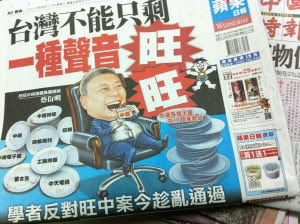On July 25, 2012, Taiwan media regulator the National Communications Commission (NCC) finally approved [1]Want Want China Times’ acquisition of 60% of the country's second largest cable television services – previously owned by China Network Systems (CNS).
The acquisition process had been under review for 18 months as the media organization has been involved in a number of scandals regarding ‘self-censorship’ practices that “erase words that are critical of China [2]“, which became an issue in particular after Tsai Eng-Meng [3], a Taiwanese businessman who has strong ties with mainland China, purchased China Times [4] in 2008.
Concerns over press freedom
Many media and journalism scholars are worried that Want Want China Times’ extension into the cable business will result in further monopoly of media in Taiwan, and a strong influence of the mainland Chinese government into Taiwanese politics.
As a compromise, the NCC introduced three conditions into the agreement: 1. Want Want China Times has to sell one of their television channels, Chung Tien [5] Television; 2. China Television [6] (CTV) has to turn into a non-news channel; and 3. CTV must establish an independent editorial system.
 [7]
[7]Taiwan's Apple Daily's headline pointed out that once the acquisition of cable service by Want Want China Times is completed, Taiwan media would be monopolized by one voice. Image from lighten-night.
Disappointed by the NCC's decision, a number of scholars protested outside the NCC office on the day the announcement was made. They believe [8] [zh] that Want Want China Times will bring harm to freedom of press in Taiwan, as well as professional and independent journalism:
令我們無法置信的是,在二十一世紀的台灣社會,只要掌握足夠的資本,就可以恣意地控制新聞資訊的傳播,就可以無情地踐踏長久奮鬥好不容易累積的民主自由。痛苦的是,旺中集團蔡衍明用金錢證明了這一切都是真會發生的悲劇。自2008年年底蔡衍明自中國回台入主中時、中視、中天以來,我們看到的是,同時掌握了金錢與媒體,不但可以影響政治、操縱輿論,更可以玩弄體制、踐踏法律!新聞可以大剌剌地當廣告賣,我國的黨政軍必須退出媒體,但中國的黨政軍透過在台灣的買辦,卻可以在我國置入新聞!媒體不僅可以當成私人復仇的工具,更可以拿來幫反民主、反極權[sic]的政體擦脂抹粉。順我者昌、逆我者亡,儘管行徑張狂,但是只要有頻道,不怕買不到願意表演辯護的名嘴;只要有媒體,政客就紛紛被綁架,噤聲不語。
Dramatic withdrawal
Dramatically, whilst NCC was willing to compromise, Tsai withdrew from the conditional terms and claimed that the Want Want China Times Group will not sell Chung Tien Television to anyone [9] [zh].
In addition, as if to retaliate against one of the scholars, Huang Kuo-chang (黃國昌) – a research fellow at Academia Sinica who has been a major public opinion leader against the acquisition – various Want Want media outlets, including Chung Tien TV and China Times, accused Huang [10] of paying students to protest outside the NCC on July 25. In addition, they claimed that Huang was planning to flee to the United States.
Huang Kuo-chang clarified in a press conference [11] [zh] that he only organized the scholars to read the statement in front of the NCC and was not aware of the student protest which came after the scholar petition. Whilst Jean Liu, Huang's wife, explained [12] [zh] via Facebook that their trip to the US is funded by the Fulbright Senior Scholar's Program, which was approved in early May 2012.
At the same time, Taiwan's Apple Daily reported that some netizens had identified [13] [zh] the deputy editor of the Times Weekly, one of the Want Want media outlets, amongst the student protesters and speculated that the whole incident was a staged scandal to assassinate Huang's character.
Frustrated by Want Want China Times’ abuse of media power, on July 28 the Association of Taiwan Journalists posted a statement [14] [zh] on their Facebook page:
台灣新聞記者協會對旺中媒體集團違背新聞專業與新聞倫理,以惡質的新聞操作手法抹黑學者,感到痛心。
中時記者將兩場完全沒有交集的抗議活動,連結為同一則新聞報導…其次,該報導操弄「平衡報導」原則,將根本沒有關係的對象,刻意以「查證回應」的方式,將黃國昌老師設定為所謂的「幕後黑手」,此種為達媒體目的,無中生有創造新聞的作法,根本就是媒體專業的淪喪。…該媒體卻在毫無證據下,以新聞報導、特稿質疑方式,將黃國昌老師套上莫須有的角色,記協對於台灣存在這樣的媒體,感到極度的痛心。
Renewtwculture [15] [zh] created a news package about the incident and commented:
經過旺旺的示範,我們終於知道如何才可以批鬥、抹黑一個人,運用自己的電視台、新聞台、報紙、雜誌,好像”輿論”就是證據,眾口鑠金,明明沒有任何證據,就可以毫無疑問的批鬥一個人[…]不過這種事情不是眼尖的觀眾恐怕看不出來,這就是媒體巨獸可怕的地方。